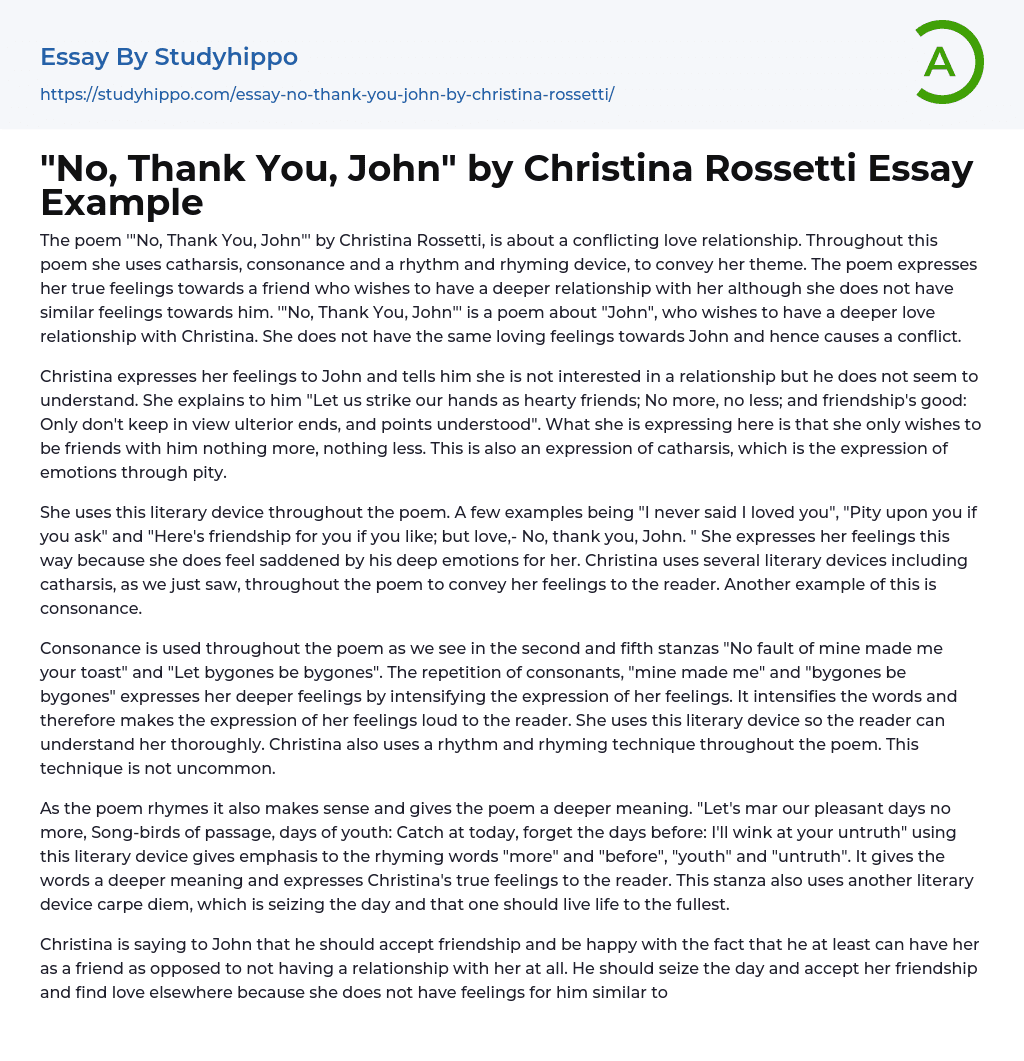

“No, Thank You, John” by Christina Rossetti Essay Example
The poem '"No, Thank You, John"' by Christina Rossetti, is about a conflicting love relationship. Throughout this poem she uses catharsis, consonance and a rhythm and rhyming device, to convey her theme. The poem expresses her true feelings towards a friend who wishes to have a deeper relationship with her although she does not have similar feelings towards him. '"No, Thank You, John"' is a poem about "John", who wishes to have a deeper love relationship with Christina. She does not have the same loving feelings towards John and hence causes a conflict.
Christina expresses her feelings to John and tells him she is not interested in a relationship but he does not seem to understand. She explains to him "Let us strike our hands as hearty friends; No more, no less; and friendship's good: Only don't ke
...ep in view ulterior ends, and points understood". What she is expressing here is that she only wishes to be friends with him nothing more, nothing less. This is also an expression of catharsis, which is the expression of emotions through pity.
She uses this literary device throughout the poem. A few examples being "I never said I loved you", "Pity upon you if you ask" and "Here's friendship for you if you like; but love,- No, thank you, John. " She expresses her feelings this way because she does feel saddened by his deep emotions for her. Christina uses several literary devices including catharsis, as we just saw, throughout the poem to convey her feelings to the reader. Another example of this is consonance.
Consonance is used throughout the poem as we see in the second and fifth stanzas "No
fault of mine made me your toast" and "Let bygones be bygones". The repetition of consonants, "mine made me" and "bygones be bygones" expresses her deeper feelings by intensifying the expression of her feelings. It intensifies the words and therefore makes the expression of her feelings loud to the reader. She uses this literary device so the reader can understand her thoroughly. Christina also uses a rhythm and rhyming technique throughout the poem. This technique is not uncommon.
As the poem rhymes it also makes sense and gives the poem a deeper meaning. "Let's mar our pleasant days no more, Song-birds of passage, days of youth: Catch at today, forget the days before: I'll wink at your untruth" using this literary device gives emphasis to the rhyming words "more" and "before", "youth" and "untruth". It gives the words a deeper meaning and expresses Christina's true feelings to the reader. This stanza also uses another literary device carpe diem, which is seizing the day and that one should live life to the fullest.
Christina is saying to John that he should accept friendship and be happy with the fact that he at least can have her as a friend as opposed to not having a relationship with her at all. He should seize the day and accept her friendship and find love elsewhere because she does not have feelings for him similar to his deep feelings towards her. Her uses of literary devices are uniquely placed and are apparent to the reader thus making her emotions some across as strong so the reader understands her tone.
Just to name a few catharsis, consonance, her rhyming technique and easing into
the cape diem idea all make Christina's points come across strongly. Although she expresses her feelings towards not having deep emotions for John in this poem, this does not simply mean she does not care for him all together. She obviously cares deeply for him since she took the time to write a poem. Her feelings just lie on more of a friendship level than his do.
- Aldous Huxley essays
- Alice Walker essays
- Amy tan essays
- Anne Bradstreet essays
- Anton Chekhov essays
- Arthur Miller essays
- Augustine essays
- Bertolt Brecht essays
- Booker T Washington essays
- Carol ann duffy essays
- Charles Dickens essays
- Charlotte Perkins Gilman essays
- Chinua Achebe essays
- Christina Rossetti essays
- Consider The Lobster essays
- Edgar Allan Poe essays
- Elizabeth Bishop essays
- Emily Dickinson essays
- Ernest Hemingway essays
- F. Scott Fitzgerald essays
- George Orwell essays
- Harper Lee essays
- Homer essays
- James Baldwin essays
- Jane Austen essays
- John Donne essays
- John Steinbeck essays
- Kate Chopin essays
- Kurt Vonnegut essays
- Langston Hughes essays
- Leonardo Da Vinci essays
- Mark Twain essays
- Mary Shelley essays
- Maya Angelou essays
- Nathaniel Hawthorne essays
- Oscar Wilde essays
- Percy Bysshe Shelley essays
- Peter Skrzynecki essays
- Phillis Wheatley essays
- Poets essays
- Ralph Waldo Emerson essays
- Ray Bradbury essays
- Richard Rodriguez essays
- Robert Browning essays
- Robert Frost essays
- Robert Louis Stevenson essays
- Seamus Heaney essays
- Sherman Alexie essays
- Sophocles essays
- Stephen King essays



